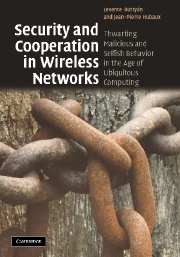 Security and Cooperation in Wireless Networks
Security and Cooperation in Wireless Networks Appendix B - A tutorial on game theory for wireless networks
Published online by Cambridge University Press: 05 June 2012
Summary
Introduction
As we have mentioned in Chapter 3, the way of the future for the proper operation of wireless networks consists in the deployment of appropriate rule enforcement mechanisms. These mechanisms should prevent or discourage malicious and selfish behavior. The design of the latter can tremendously benefit from game theoretic modeling.
Game theory is a discipline aimed at modeling situations in which decision-makers have to choose specific actions that have mutual, possibly conflicting, consequences. It has been used primarily in economics, in order to model competition between companies: for example, should a given company enter a new market, considering that its competitors could make similar (or different) moves? Game theory has also been applied to other areas, including politics and biology.
In wireless networks, the players can be either wireless stations striving to obtain as much possible bandwidth from the (shared) medium; or they can be wireless operators aimed at increasing their market share or their revenue. It is clear that in both cases, the actions of a given player can affect other players, sometimes in a negative way.
In this tutorial, we carefully explain how situations of this kind can be modeled by making use of game theory; for the sake of simplicity, we restrict ourselves in this appendix to the case in which the players are wireless stations (the reader interested in the interactions between operators should refer to Chapter 11).
- Type
- Chapter
- Information
- Security and Cooperation in Wireless NetworksThwarting Malicious and Selfish Behavior in the Age of Ubiquitous Computing, pp. 423 - 457Publisher: Cambridge University PressPrint publication year: 2007


